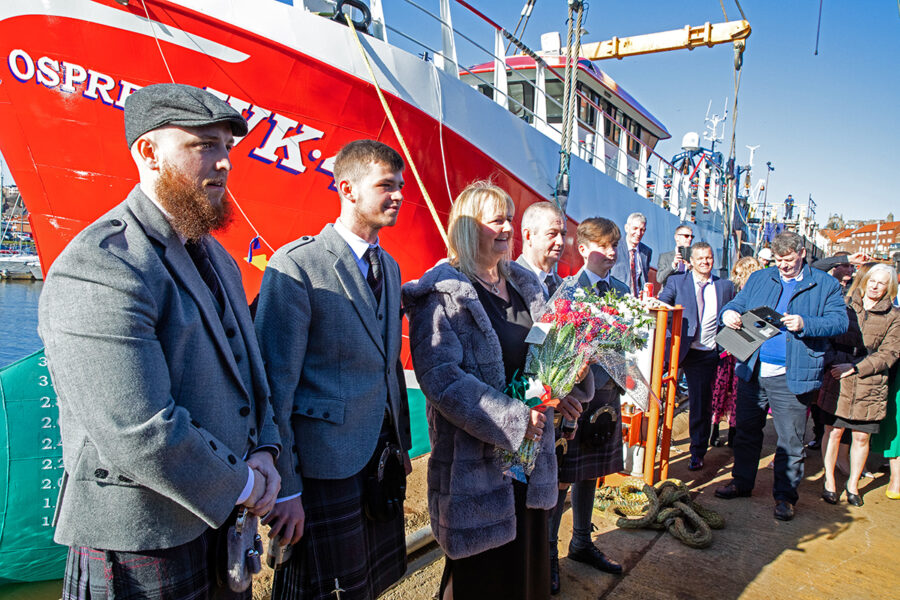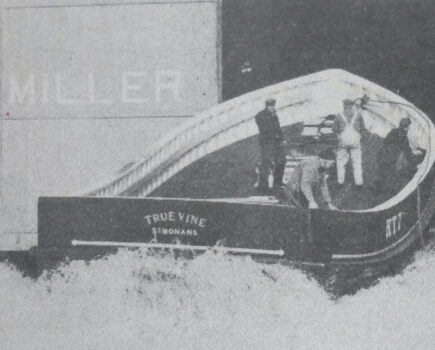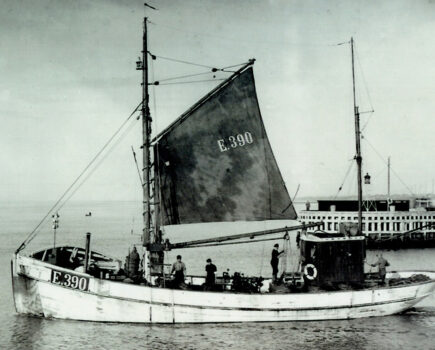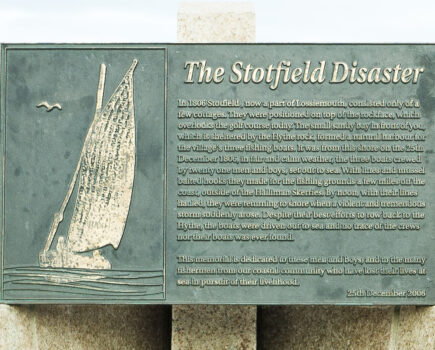Gaby Bartai and David Linkie look back on 12 months of challenge and change
‘Change is the only constant’ is a phrase we often use in relation to the fishing industry, but 2020 took that to an entirely new level. It was already set to be a watershed year, bookended by our official departure from the EU at the end of January, and the prospect of freedom from the CFP at the end of December.
The onset of the Covid-19 pandemic in February was a curveball that no one could have predicted, throwing all of our plans for 2020 into disarray. On top of that, the confident promises from government of a brighter future for the industry beyond the CFP became increasingly mired in trade negotiations that stretched to June, then to October, November, December… and now, apparently, beyond.
As always, the industry dug deep and persevered, and the later months of the year have seen some welcome signs of recovery, with new boats delayed by the pandemic being launched and markets showing resurgent demand.
In this lockdown year, when everyone’s working patterns were disrupted and nothing was straightforward, Fishing News depended more than ever on the support of the industry it represents. Our grateful thanks go to the many friends and colleagues across the industry who stepped up to provide assistance, information and photographs, often at very short notice and despite difficult circumstances of their own.
January

The 34m beam scalloper Alcedo is rolled out of Parkol’s fabrication hall on Teesside.
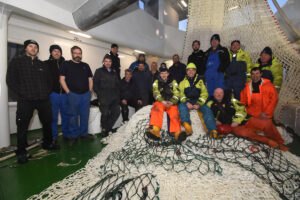
The crew of the new Lunar Bow come together for a group photo – which turned out to be the only one taken in 2020, due to the imminent outbreak of the Covid-19 pandemic.
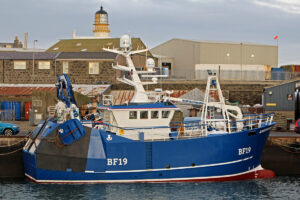
The new twin-rig prawn trawler Amethyst berthed at Fraserburgh.
The stage was set for 2020 by the 12 December general election, in which a higher than anticipated Conservative win gave the government a majority of 80. This meant that after nine months of delay and frustration since the original Brexit date of 29 March, 2019, the EU withdrawal bill could finally be passed. North of the border, however, the SNP secured 48 of the 59 seats, increasing pressure for a second independence referendum.
A week later, the last Fisheries Council that the UK would attend as an EU member state saw significant cuts in a number of key stocks for UK fishermen for 2020 – notably cod, where the North Sea TAC was cut by 50% – as the Commission pressed ahead with what NFFO chairman Barrie Deas described as ‘an unrelenting focus on the single MSY objective, and along with it a wilful disregard for consequences in the real world’. This raised the prospect of fisheries being choked in 2020 by the demands of the landing obligation.
On 31 January, 2020, the UK officially left the EU, amid much uncertainty about how the ramifications would play out for the fishing industry. Concerns had been raised over the month about the prospect of tariffs and extra paperwork for Northern Ireland fishermen as a result of an Irish Sea border, and about the danger that fishing would be traded away in the negotiations in the interests of the financial services sector.
In Ireland, the ban on vessels over 18m fishing inside the 6nm limit, which had been announced a year previously, came into force on 1 January.
Skipper Willie Whelan and crewman Joe Sinnott lost their lives when the beam scalloper Alize WD 207 sank off Hook Head on 5 January, and top Fife skipper Davy Smith MBE died at the age of 89.
The Kirkcudbright beam scalloper Alcedo BA 77, built by Parkol Marine Engineering, was launched in Teesside. The twin-rig prawn trawler Amethyst BF 19, built by Mooney Boats, arrived at Fraserburgh, and the 80m pelagic vessel Lunar Bow PD 265, built by Karstensens shipyard, left Skagen for Peterhead.
The start of 2020 also brought change at Fishing News, as David Linkie stepped back from frontline editorial duties and Gaby Bartai took over the weekly production of the paper. A vertiginous learning curve ensued. Six weeks later, our longstanding art editor Rob Terry handed over the design reins to Nick Bond, and the following month, Simon Hyland took over from Gary Smythson in the advertising team.
Three core staff changes in as many months would have been challenging at the best of times; add the onset of a pandemic, and you have a recipe for chaos – but, as ever, teamwork and goodwill pulled us through, and our thanks go to everyone in the Fishing News team, past and present.
February
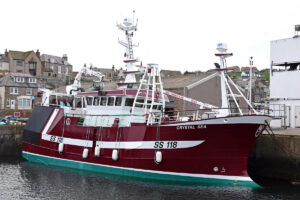
Crystal Sea, photographed at Macduff during a flying 24-hour trip to Peterhead to compile a feature on the new Lunar Bow.
February opened with the news that the new fisheries bill, setting out the legislation that would allow the UK to manage its fisheries as an independent coastal state, had been introduced into parliament. The MMO, meanwhile, issued a warning to fishermen that despite our official exit from the EU, nothing had actually changed yet, and all existing rules had to be followed until the end of the transition period.
The 13 February Cabinet reshuffle saw fisheries minister George Eustice promoted to become secretary of state for environment, food and rural affairs, and Oxfordshire MP Victoria Prentis named as the new fisheries minister.
The MMO moved to reassure the U10 sector that improvements were being made to its Catch App reporting software, following extensive reports of issues with the new system and the launch of a campaign to #ScrapTheApp.
The twin-rig trawler Crystal Sea SS 118 arrived at Newlyn after a 1,000-mile delivery passage from Macduff, while the 12m crabber Royal Rebel was launched at Shoreham and the 11.95m Grimsby potter Lady Sophie ran sea trials from Padstow.
In the 27 February issue, all unawares, we ran a preview of the Irish Skipper Expo, which was scheduled to be held in Limerick on 13 and 14 March. The topic that – alongside Brexit – would dominate the paper for the remainder of the year had still not rated a single mention.
March
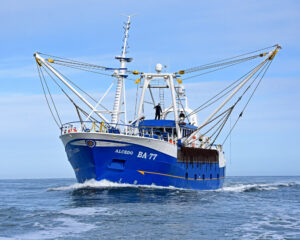
Alcedo leaving Whitby for fishing trials.
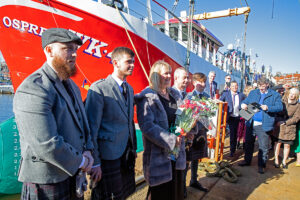
Osprey is named in fine spring weather at Whitby in front of 160 guests.
The month began with the headline ‘Brexit battle begins’, and the news that the UK and EU were polarised on fishing in the trade negotiations. The UK government was quoted as saying that it would walk away from the talks if there was no agreement by June.
In the 5 March issue, an article about the problems faced by the Irish crab industry due to Chinese regulations on permissible cadmium levels mentioned, for the first time, another threat to trade with China, ‘the rapid spread of the coronavirus and the subsequent restrictions on the movement of goods’.
By the 12 March issue, ‘Virus fears hit seafood trade’ was headline news. The story reported that over the past week, the issues with export trade had spread to other export markets for high-end seafood, notably Italy – but the story only made page 3. That week also reported that the Irish Skipper Expo had been postponed ‘due to coronavirus uncertainty’. By the time the week’s Comment was written, events were moving fast enough for the virus to be its topic – but the piece focused on the threats to the Chinese and European export markets. There wasn’t even a mention, yet, of possible disruption at home.
In the 19 March issue, coronavirus was still not the main story (allowing, as always, for the fact that the paper goes to the printer seven days before the date on the cover). The postponement of the Brussels Seafood Expo was announced, but so were new dates for the Irish Skipper Expo – in September.
By the time the 26 March issue was being put together, the shape of things to come was becoming all too clear. ‘Coronavirus crisis’ was the main cover headline. Stories inside reported that in addition to the almost complete closure of export markets, domestic markets were threatened by the imminent closure of the hospitality sector, and the industry was facing an ‘existential crisis’, with many boats looking at having to tie up. It was announced that the Scottish Skipper Expo would be postponed, and that the Fishing News Awards presentation evening in May had been cancelled, with the 2020 awards to take place virtually.
The 26 March Comment was headlined ‘Industry needs urgent financial help’. The impending financial hit was also threatening the media sector. With news-stand sales falling rapidly with the imposition of the first lockdown, Kelsey Media, the publisher of Fishing News, took immediate steps to cut costs to safeguard the future of its titles. A phonecall gave us just six hours’ notice to reduce the paper to 24 pages – a measure we were obliged to maintain through the summer.
Alcedo, the last new boat that Fishing News was able to photograph first-hand, ran fishing trials from Whitby in fine early spring weather, while the Orkney 35.2m twin-rig stern trawler Aalskere K 337 ran trials from Thyborøn.
The Scrabster 18.8m vivier-crabber Osprey WK 4, built by Parkol Marine Engineering, was launched in the second week of March. We reported: “One hundred and sixty family members and friends travelled to Whitby from around the world, including Australia and Canada, as well as Kinlochbervie, Stornoway, Orkney, Aberdeenshire, Caithness and England, to help to celebrate the owners’ special day. After being given the opportunity to look over the virtually completed Osprey, the guests enjoyed a celebratory evening function at The Stables in Whitby” – with no inkling of how strange those words would come to sound.
April
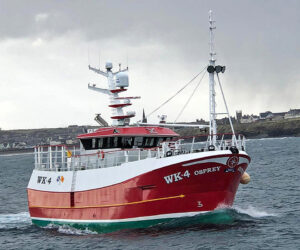
Osprey crossing Thurso Bay for the first time…
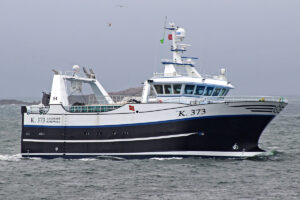
… and Aalskere arriving in Scotland from Denmark.

Social distancing measures were quickly and efficiently implemented on Peterhead fishmarket to enable trading to continue.
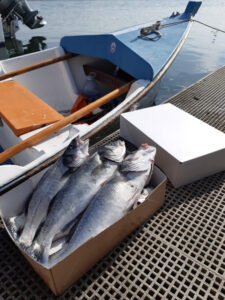
Bass landed from a south coast inshore boat and ready for local sale that day – with exports markets closed, many fishermen diversified into supplying their local markets.
April opened with the headline ‘Aid for industry’ and the announcement of the first packages of support for the self-employed and the Scottish U12 sector. We reported that Peterhead’s new social distancing measures were enabling the market to continue operating – but also that the market at Grimsby had been forced to close due to plummeting demand.
The 9 April issue reported on effort cuts in an attempt to match demand and stabilise prices on extremely volatile markets. Most prawn boats, crabbers and scallopers were tied up, with whitefish boats restricting landings. The UK and devolved governments were reported to be working urgently on tailored support packages for the industry. On the upside, there were the first signs of a boom in home deliveries.
The following week’s issue reported on growing calls for support for the English and Irish fleets and the over-12m sector in Scotland, while the Northern Ireland fleet welcomed a £1.5m support package, and £370,000 in funding was announced in the Isle of Man. A week later, a support package for the Welsh fleet was announced.
Funding packages for English under-24s and Scottish over-12s were reported at the end of the month – alongside concerns about loopholes in the qualifying criteria in the various schemes, and about the many vessels for which there was still no support. The Fishmongers’ Company and Seafarers UK launched a £500,000 fund to help fish and seafood businesses through the crisis, and there were reports of initiatives around the country to support direct sales of fish to the public.
The obituary of Kilkeel fisherman and PO stalwart Lenny McLaughlin in the 16 April issue was the first in a heart-breaking run of seven obituaries in just five weeks, as coronavirus added its grim toll to other losses. The following two issues reported the deaths of Bill Hocking of Looe, James Duff of North Shields and Donald John Macdonald of Ullapool.
With the national lockdown now in force, and Fishing News contributors around the country confined to home, the next few months’ issues suddenly featured an alarming number of potentially blank pages. With most of the planned boat, port and fishing features having to be postponed indefinitely, our contributors delved into their archives to produce replacement features with a necessarily historical slant. On the news front, the industry stepped up – as it always does in any time of need – providing information and photographs via phonecalls and emails.
Skipper Jamie Clark kick-started this extremely welcome support in fine style by climbing to the top of the foremast to take photographs, before emailing the onboard pictures that made the feature on the new Alcedo possible.
In months to come, a number of other skippers and friends went to similar lengths to provide invaluable support which was very much appreciated.
On the new-boat front, Osprey and Aalskere arrived at their home ports of Scrabster and Kirkwall in preparation for their first trips.
May
The start of the month saw the first non-Covid headline in five weeks – but the topic was hardly a breath of fresh air: ‘Brexit talks deadlocked’. It was reported that there had been no progress on fisheries in the latest round of talks, and that the UK government was determined not to ask for an extension to the transition period. At the end of the month, it was reported that the UK had finally published its draft Brexit negotiating text on fisheries, laying out the UK ‘red lines’ – but also that another round of talks had ended without progress.
On the Covid front, the month began with the announcement that the £1m Domestic Seafood Supply Scheme funding package was now open – but that the French were blocking imports of Scottish fish in order to bolster their domestic market. The following week, it was reported that Scottish whitefish vessels had agreed to an eight-day tie-up during May in an attempt to align supply and demand – and that French and Spanish vessels were taking advantage of this by moving into vacated grounds.
MMO figures showed a sharp decline in fishing activity over the past two months, with UK vessels’ landings down 17% by volume and 26% by value since the start of the Covid-19 lockdown. At Peterhead, whitefish landings over the eight weeks since the start of the lockdown had dropped by over 50% on the same period in 2019, while in Shetland they were down by nearly 40%.
A voluntary tie-up scheme for Irish vessels was announced – but reactions to the scheme from the industry included ‘an insult to our intelligence’ and ‘completely unworkable’, and those were only the printable ones.
The end of May saw reports that POs and processors were in talks to try to resolve the prawn oversupply problem, which predated the Covid-19 crisis but had been exacerbated by it. It was also reported that two fishermen’s organisations had sent a lawyer’s letter to DEFRA warning that any prosecutions based on Catch App data would be challenged in court.
One brighter note was a report from the EU Commission which found NE Atlantic stocks to be in good health, with stocks and recruitment rising as a result of falling effort over the past two decades.
June
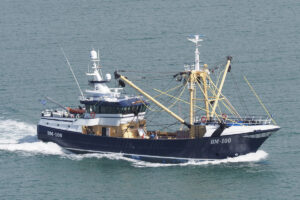
Georgina of Ladram made history on arrival at Brixham.
June began with the encouraging news that daily capacity on Peterhead fishmarket had been increased to 6,500 boxes, following the 5,000-box limit imposed at the start of the lockdown.
It was announced that the UK would not be seeking an extension to the Brexit transition period, upping the pressure on negotiators to avoid a no-deal exit at the end of the year – but there were the first indications that the EU might be prepared to compromise on its ‘no change to access and quota shares’ stance.
The three crew of the Devon scalloper J-Sea were rescued safely after five hours adrift in the North Sea, after their vessel capsized without warning.
A DEFRA review recommended the introduction of no-take Highly Protected Marine Areas in English and Northern Irish waters, and the new Irish government announced a commitment to designating up to 30% of Irish waters as MPAs by 2030.
An ICES report found pulse beaming to be less damaging to the marine environment than conventional beam trawling, raising the unwelcome prospect of a revisiting of the EU ban on the method.
The MMO gave an assurance that there would be no prosecutions in relation to the U10 Catch App until ‘a later date’.
The month ended with gear conflict in Shetland waters, when the Spanish-owned German-registered netter Pesorsa Dos attempted to foul the propeller of the local whitefish trawler Alison Kay, leading to calls for the MCA to take action against foreign boats harassing UK vessels.
The 35m Georgina of Ladram BM 100, the biggest new beamer to be built for Brixham, and the first for 30 years, arrived at the South Devon port.
The winners of the Fishing News Awards 2020 were announced in a virtual presentation ceremony on 15 June, with winners including Demersal Fisherman of the Year David Milne, Pelagic Fisherman of the Year Will Burton, Shellfishermen of the Year Stewart Poland and Neil Barnard, Young Fisherman of the Year David Clark and Trainee Fisherman of the Year Campbell Hunter. The Lifetime Achievement Award went to Sam Lambourn.
July
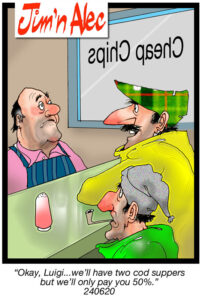 The first week of July brought the news that fishermen working in the northern North Sea were to be hit with a range of new restrictions aimed at protecting cod stocks. Later in the month, it was reported that ICES had recommended a 60% increase in the North Sea haddock TAC for 2021 – but a further cut of 13-14% for cod.
The first week of July brought the news that fishermen working in the northern North Sea were to be hit with a range of new restrictions aimed at protecting cod stocks. Later in the month, it was reported that ICES had recommended a 60% increase in the North Sea haddock TAC for 2021 – but a further cut of 13-14% for cod.
A report revealed that between 2011 and 2018, vessels from EU member states landed an additional 60% fish and shellfish from the UK exclusive economic zone, while UK boats landed just 17% more.
The flagship fisheries bill entered the House of Commons, and it was reported that green groups were pushing for amendments that would enforce rigid MSY targets and make onboard cameras compulsory.
The Future of Our Inshore Fisheries project announced a wide-ranging action plan to take forward reform of inshore fisheries management, and the Fishing Industry Safety Group launched the Home and Dry campaign to encourage all fishermen to wear PFDs and undertake daily safety checks.
It was reported that a significant number of non-EEA crewmen had found themselves stranded onboard their vessels at the end of their contracts, with no way to get home due to Covid travel restrictions, no UK welfare support, and sometimes no money because skippers could not afford to pay them. The Grimsby auction reopened after its Covid-enforced closure, and the Shipwrecked Mariners’ Society launched a £1m Covid-19 Response Fund.
The new 27.46m midwater pair-trawler Ella G 233 arrived in Killybegs from Latvia for fit-out by Mooney Boats.
At Fishing News, the relaxation of lockdown restrictions translated into permission to reinstate the four missing pages in the paper from the end of July, and the gradual reappearance of ‘current’ feature copy as contributors around the country were able to resume some visits to ports.
August
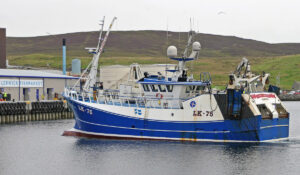
Venturous heads in to land to the new Lerwick fishmarket.
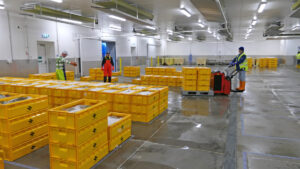
Laying out boxes of whitefish in the new Scalloway market.
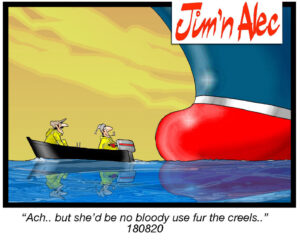 History was made in Shetland when, in successive weeks, the first whitefish were landed into the new markets at Lerwick and Scalloway – the completion of which, after delays due to Covid-19, represented a tremendous long-term boost for the fishing industry in the islands.
History was made in Shetland when, in successive weeks, the first whitefish were landed into the new markets at Lerwick and Scalloway – the completion of which, after delays due to Covid-19, represented a tremendous long-term boost for the fishing industry in the islands.
Galway fishermen Patrick and Morgan Oliver were hailed as heroes following their rescue of two paddleboarders who had survived 15 hours adrift. Twenty miles off the Tynemouth coast, two crewmen were rescued when the 16.7m prawn trawler Diamond D capsized and sank after picking up a large boulder in the trawl and landing it on deck.
With the latest round of talks having ended without agreement, and the UK’s supposed June deadline to conclude a trade deal having long sailed, it was reported that fisheries was still one of the major stumbling blocks in the negotiations – and that the end of October was definitely the latest date by which an agreement could be reached.
It was reported that foreign supertrawlers had spent twice as much time fishing in UK MPAs in the first half of 2020 as in the whole of 2019, and over 10 times as much as in 2017.
The 28m Shetland whitefish stern trawler Courageous LK 470 was launched in Gdansk.
September
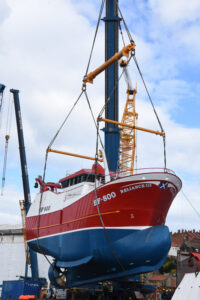
Reliance III is lifted into the river Esk at Whitby.
September began with news of the unsuccessful conclusion of yet another round of Brexit talks, and warnings that ‘the clock was ticking’.
The UK fisheries bill continued its progress through parliament, despite opposition from the SNP and the continuing threat of an amendment enforcing MSY targets and REM onboard all vessels, which the industry argued would prevent the benefits of freedom from the CFP being realised. At the end of the month, it was reported that this had been voted down.
Charlie McConalogue was appointed Irish minister for agriculture, food and the marine, making him the fourth person to hold the position in a year. The first appointee by the new Irish government had to resign after 17 days due to an undisclosed drink-driving conviction, and the second lasted just 30 days before being forced out by a Covid guidelines breach.
The controversial EU penalty points legislation was enacted into Irish law, making this the fourth attempt by the Irish government to bring the EU system into Irish law in a form that would stand up to challenge in the courts.
In Wales, Flint shellfisherman Chris Mossman lost his life in an accident on the river Dee.
The Yorkshire Marine Research Centre opened in Bridlington, moving forward the town’s plans to brand itself the ‘lobster capital of Europe’, and in Eastbourne, work on the long-promised new fishermen’s quay finally got underway.
In a welcome return towards normality, the new Banff twin-rig trawler Reliance III BF 800 was launched at Whitby, albeit with social-distancing measures prominent, including the total absence of the many family members and friends whom skipper John Clark would have invited in normal circumstances.
October
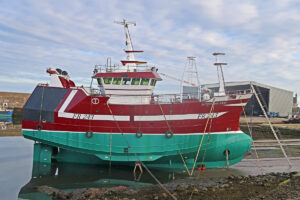
Jacqueline Anne ready for launching at Buckie.
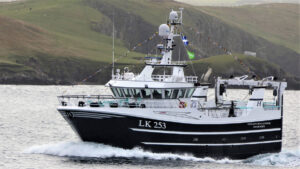
Ocean Challenge arriving in Shetland from Killybegs. (Photo: Sydney Sinclair)
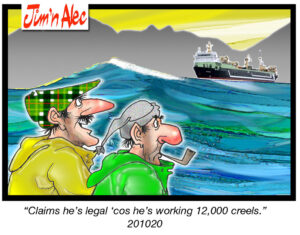 In the first signs of the UK ‘pinking’ its red lines on fisheries in the Brexit negotiations, it was reported that it had offered the EU a three-year fisheries transition – leading to immediate calls from the NFFO and SFF for the government to honour its original line. As the supposed October deadline to strike a deal loomed, it was reported that talks would be continuing, with the next EU summit on 15 November suggested as the new last-possible deadline.
In the first signs of the UK ‘pinking’ its red lines on fisheries in the Brexit negotiations, it was reported that it had offered the EU a three-year fisheries transition – leading to immediate calls from the NFFO and SFF for the government to honour its original line. As the supposed October deadline to strike a deal loomed, it was reported that talks would be continuing, with the next EU summit on 15 November suggested as the new last-possible deadline.
The UK signed a fisheries framework agreement with Norway – its first as a newly independent coastal state.
A single-handed fisherman was rescued off the Dorset coast after his vessel Dawn Run sank in the early hours of the morning, and two crew were rescued after the Weymouth-based vessel Ocean Echo capsized off Portland Bill.
John McTaggart of Lossiemouth died after falling from the seine-netter Acorn, which was working as a guard vessel east of Stonehaven.
The largest MPA in Europe, covering 100,000km2 off the west coast of Scotland, came into force. Meanwhile, Greenpeace dumped granite boulders in the Dogger Bank SAC in an attempt to prevent bottom trawling in the area.
Seafarers UK released landmark research into the financial health of fishing communities, highlighting the lack of a ‘safety net’ for share fishermen and laying the ground for projects to take the report’s recommendations forward.
The Scottish government set out plans for major changes to how the industry is managed from 2021, with ideas under consideration including TACs for some non-quota species and groups other than POs having quota management responsibility.
The ban on over-18m vessels trawling within the Irish 6nm limit was overturned by the Irish High Court, leading to renewed conflict between the inshore sector and representatives of larger vessels.
The Queen’s Birthday Honours list included an OBE for former SFF chief executive Bertie Armstrong, an MBE for South Western FPO chief executive Jim Portus and a British Empire Medal for retired Bridport skipper David Sales.
The UK Sea Fisheries Statistics 2019, published by the MMO, showed that UK vessels had landed 622,000t for a value of £986.8m in 2019. In terms of catch value, the 2019 total was 2% lower than the previous year’s record figure of £1,002.8m, and the tonnage was 11% lower than the 700,000t landed in 2018.
The Fraserburgh 24.5m twin-rig trawler Jacqueline Anne FR 243 was launched by Macduff Shipyards at Buckie, and the 28.5m twin-rig whitefish stern trawler Ocean Challenge LK 253 was named at Skerries within 24 hours of arriving in Shetland from Killybegs, where the vessel was fully fitted out by Mooney Boats.
November

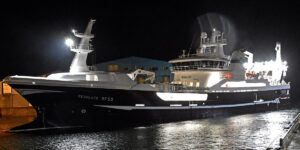
The new midwater trawler Resolute arriving at Fraserburgh.
The month opened with a sign of the huge shift underway in fisheries management: the European Commission’s proposals for NE Atlantic and North Sea TACs were published, but with proposals in place for only 23 of more than 100 stocks. The remainder were subject to negotiations with the UK and Norway once the Brexit trade talks reached agreement (or not).
As the 15 November ‘deadline’ to agree a Brexit deal approached, we reported, on the best available authority, that there were just ‘days’ left to reach a deal. There weren’t; the deadline passed, and the talks went on. Meanwhile, warnings began to emerge that the new bureaucracy required by the MMO after the end of the transition period could result in 48-hour delays before seafood exports could start to move.
The UK signed fisheries agreements with the Faroes and, later in the month, with Iceland and Greenland, meaning that it now had framework agreements in place with each of its principal fisheries partners across the NE Atlantic.
Hopes of a resolution to the problems of employing foreign crew were dashed with news that the home secretary had rejected – for the time being – the proposal of the Migration Advisory Committee to class deckhands as skilled workers.
The announcement of a month-long second lockdown in England prompted calls for a second support package for the English industry. The MMO announced fast-track grants to help ports and harbours affected by the pandemic, and to provide health and safety equipment for vessel owners, by repurposing the balance of the EMFF.
Inshore and green groups in Ireland called for the reinstatement of the ban on over-18m vessels trawling inside six miles, and the Irish minister for agriculture, food and the marine launched an appeal against the High Court’s decision overturning it.
The Galway industry suffered a double tragedy with the deaths of father and son Martin and Tom Oliver following an accident at sea.
Two crew were rescued by the Tynemouth lifeboat after the North Shields-based 9.9m trawler Achieve collided with a cargo ship – but attempts to tow the vessel failed, and it sank.
The one-millionth box of whitefish for the year was sold on Peterhead fishmarket in the middle of the month. That this landmark was achieved seven weeks later than in 2019 highlighted the challenges created by the Covid-19 pandemic, in conjunction with reduced whitefish quotas.
The new 69.8m midwater trawler Resolute BF 50, built by Astileros Balenciaga SA, arrived in Fraserburgh at the end of a 1,140nm delivery passage from northern Spain. After the crew had quickly rigged out the new vessel, Resolute crossed the North Sea to run fishing trials from Norway, before starting to fish mackerel east of Shetland.
December
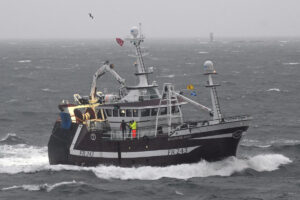
Jacqueline Anne…
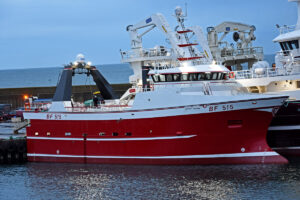
… and Endeavour V ran fishing trials within one week of each other.
The final month of a tumultuous year began with positive news: the flagship fisheries bill, giving the UK full control of its waters after Brexit, was passed to become the Fisheries Act 2020 – the UK’s first major domestic fisheries legislation for nearly 40 years. It was greeted as a ‘landmark event’ by the national federations, and with notably less enthusiasm by the Scottish government and green groups.
On the downside, it was reported that there was still a ‘huge gap’ on fisheries in the Brexit trade negotiations, with the clock ticking down and the odds on a deal dropping by the day. Meanwhile, it was reported that Ireland and France were already at loggerheads over the dividing up of the €5bn EU Brexit compensation fund.
The start of the month was also marked by tragedy, with the news that two men had been lost when the scalloper Joanna C sank off Newhaven in late November. Skipper David Bickerstaff was saved by the crew of the Newhaven lifeboat, who found him clinging to a lifebuoy. The body of Adam Harper was recovered from the wreck, but the body of Robert Morley is still missing.
The Hartlepool lifeboat reached the trawler Provider AH 71, which was rapidly taking on water, with minutes to spare, delivering the vessel and its three crew safely back to harbour.
UK Fisheries, the company operating the UK’s last distant-waters trawlers, warned that despite the UK’s framework agreement with Norway, nothing concrete had yet been agreed on access to Norwegian waters in 2021– meaning that the vessels might no longer be able to operate from Hull.
Two 12m catamarans, Shazleah SO 672 and Sharon Anne BH 124, joined the Killybegs and Blyth fleets. The Orkney whitefish stern ramp trawler Westra Fjord was lifted into the water at Gdansk, and the vivier-potter Isabelle PW 64 was readied for fishing from Padstow.
Two new twin-rig trawlers built by Macduff Shipyards, Jacqueline Anne and Endeavour V, ran fishing trials in a busy end to the year, in which boatbuilders had experienced considerable challenges in relation to the coronavirus pandemic.
Fears grew of the threat to the UK industry from hugely increased paperwork, bureaucracy and delays after the end of the transition period, regardless of whether or not a deal was struck. That prospect looked ever more unlikely as we sent the penultimate issue of the year to the printers, with still no decision – and apparently no limit to the times the words ‘last chance’ could be uttered.
Even last week, we assumed that by the time we completed the final issue of 2020, we would have some decisions to report – but here we are, with hardly more clarity on future fishing opportunities than there was at the start of the year. The two big stories of 2020, Brexit and Covid, look set to run and run.

